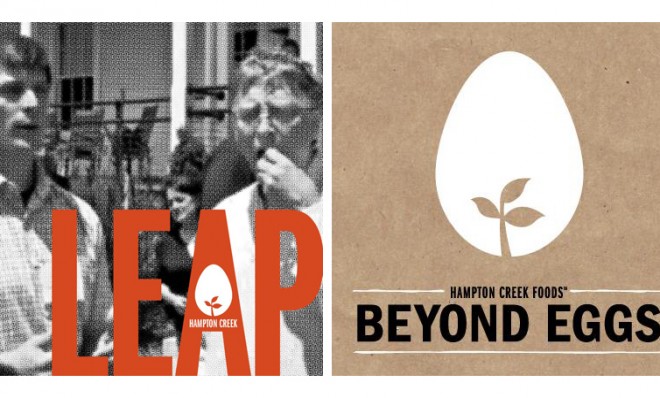Silicon Valley's muddled quest to 'disrupt' the food world
Hacking your dinner isn't as fun as it sounds

A free daily email with the biggest news stories of the day – and the best features from TheWeek.com
You are now subscribed
Your newsletter sign-up was successful
In Silicon Valley, one does not simply come up with a recipe. Instead, you "disrupt" the food world by combining pasta and vegetables in an entirely new way.
Cooking tips, likewise, are dubbed "food hacks." Little did Julia Child know she was hacking Mother Nature when she recommended boiling garlic cloves for 30 seconds to make them easier to peel.
Silicon Valley's forays into the food world have always been driven by that spirit of rebellious innovation — and are often accompanied by a lot of hyperbole.
The Week
Escape your echo chamber. Get the facts behind the news, plus analysis from multiple perspectives.

Sign up for The Week's Free Newsletters
From our morning news briefing to a weekly Good News Newsletter, get the best of The Week delivered directly to your inbox.
From our morning news briefing to a weekly Good News Newsletter, get the best of The Week delivered directly to your inbox.
Some of the hype is clearly earned. Take the lab-grown beef project partly funded by Google founder Sergey Brin, which, as he claims, truly could be a "transformative" technology. After $330,000 in research costs, scientists were able to grow muscle protein from stem cells taken from a cow shoulder.
(Whether it tastes all that good is another matter. Chicago-based food writer Josh Schonwald likened a burger made from the fake beef to "an animal-protein cake.")
The latest are the chicken-less Beyond Eggs made by Hampton Creek Foods, which are now being stocked by Whole Foods stores in California. Funded partly by Microsoft billionaire Bill Gates and PayPal co-founder Peter Thiel, the company makes egg substitutes with "peas, sorghum and a few other ingredients," according to NPR.
"We want to take animals out of the equation," Josh Tetrick, the company's founder, told The Daily Mail. "The food industry is begging for innovation, especially where animals are involved — it is a broken industry."
A free daily email with the biggest news stories of the day – and the best features from TheWeek.com
The venture capitalists funding these projects, like Tony Conrad of True Ventures, have compared the shift in food production to innovations in the tech sector. "Consumers are interested in sophisticated experiences that are beautifully delivered, which we've seen happen on the web and with products like the iPhone," Conrad told The New York Times. "Now, we're seeing that happen with food and beverage."
NPR's Allison Aubrey claims it was "pretty hard to distinguish between cookies made with Beyond Eggs and those made traditionally with real eggs."
But how revolutionary is that, really? Companies catering to vegans and vegetarians have been making egg substitutes for years. Same goes for fake meat, from Soyrizo to Boca Burgers.
Perhaps the most audacious claims have been made by Soylent, a powder-meal replacement created by 24-year-old software engineer Rob Rhinehart. He claims Soylent contains all the carbohydrates, amino acids, proteins, and vitamins you need to stay healthy. A popular Kickstarter campaign has garnered the company upto $1 million in pre-orders.
"There are of course plenty of other health shakes, nutrition supplements, juice cleanses, energy drinks, etc.," writes Gawker's Adrian Chen. "But what makes Soylent unique, is that it is the first of these 'functional beverages' developed for and by young, male tech geeks."
Indeed, Doritos and Kool-Aid are probably as amazing technical achievements as any food product funded by a Silicon Valley VC. Or, as Scott Smith of Quartz puts it, "It isn't clear that this rush to re-engineer food is any different than what the mainstream food industry has been doing for years, only it's coming out of a sector of industry more interested in accelerated change for change's sake than in cracking major problems or satisfying real needs."
Keith Wagstaff is a staff writer at TheWeek.com covering politics and current events. He has previously written for such publications as TIME, Details, VICE, and the Village Voice.
-
 Minnesota's legal system buckles under Trump's ICE surge
Minnesota's legal system buckles under Trump's ICE surgeIN THE SPOTLIGHT Mass arrests and chaotic administration have pushed Twin Cities courts to the brink as lawyers and judges alike struggle to keep pace with ICE’s activity
-
 Big-time money squabbles: the conflict over California’s proposed billionaire tax
Big-time money squabbles: the conflict over California’s proposed billionaire taxTalking Points Californians worth more than $1.1 billion would pay a one-time 5% tax
-
 ‘The West needs people’
‘The West needs people’Instant Opinion Opinion, comment and editorials of the day